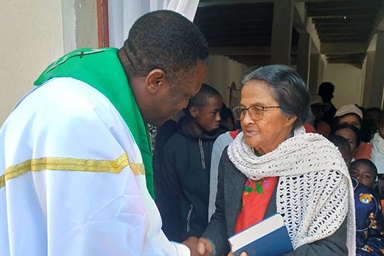At Trinity United Methodist Church in Sogonoi Village, Pastor Ruth Mwangi is busy sewing green face masks.
She and other women from the church have been doing this for the past two months to supply the local community with vital protective gear to help stop the spread of the coronavirus.
There have been nearly 3,000 confirmed COVID-19 cases and 88 deaths in Kenya, according to the latest Johns Hopkins University data.
“We decided as women to make masks for the community because they are very important at a time like now,” said Mwangi, pastor of Trinity and Ngorika United Methodist churches in the Kenya-Ethiopia Conference.
It would cost 550 Kenyan shilling ($5.50 U.S.) for local people to travel to the nearest town of Nakuru and an additional 100 shilling ($1) to purchase each mask.
“That cost is so high that most families cannot afford (it), as they live below poverty level,” said Mwangi. She added that for a community that is already struggling to have a single meal each day, masks are luxuries.
So far, the women have distributed 3,000 three-ply masks at a subsidized price of 50 shilling (50 cents) each. The low cost, coupled with the high quality of the masks, has triggered demand, said Mwangi, who has 600 masks ready for distribution.
“People have been willing to follow the ministry of health’s directive of wearing masks, but there has been no supply around,” says Nancy Mwangi, president of the Central District women’s organization.
In 2018, the women of Trinity United Methodist Church received a donation of three sewing machines from John Wesley United Methodist Church in Houston, to empower them economically and enable them to fund church projects.
Before the pandemic, the group’s 15 members had been making mostly dresses and school uniforms that they would sell to locals at affordable prices.
“Besides the joint project (of making face masks), the women — mostly widows and single mothers — usually sell handmade products like bags, scarfs and table mats,” said Nancy Mwangi, adding that those who do so earn a commission while some of the money goes to church development.
She said the sewing machines have not only empowered women economically but also enhanced unity and evangelism.
“As we meet to sew, we often share the Gospel of Christ and talk out our own social issues, thus enhancing love and unity among us,” Nancy Mwangi said.
Members of John Wesley United Methodist Church also assisted in building a two-roomed house on the church campus that is used as the women’s workshop.
The Rev. Josam Kariuki, Central District superintendent, said the church has been helping needy members who are struggling in the wake of COVID-19, as well as from a locust invasion that has destroyed crops and caused substantial losses.
“The church has been reaching out to members by giving face masks and food at this time when many have lost jobs,” Kariuki said.
He said those who have young children have been receiving fortified porridge flour to ensure good nutrition.
“At a time when there is a food shortage already, the vulnerable people such as children are more likely to suffer from nutritional deficiencies, thus the church’s intervention,” Kariuki said.
About 2,600 members have benefitted from the food in the villages of Sugonoi, Narok, KCC in Naivasha, Olkalou and Mau Narok areas, he said.
Church leaders also have been leading health talks on ways to stop the spread of the coronavirus, including washings hands, sanitizing surfaces and maintaining social distancing.
Kariuki said the best thing for church partners to do is to empower the locals to help themselves become independent.
“The donation of the sewing machines has enabled Kenyans to help fellow Kenyans at such a needful moment,” Kariuki said.
He said that also applies to farmers affected by the recent locust attack, the worst in Kenya in more than 70 years.
“Almost all members are small-scale farmers, yet the locusts covered our farms like a brown clod, destroying our young corn, beans and potato crops,” said the Rev. Stephen Maina, pastor of Sogonoi United Methodist Church.
He said the locust invasion has left many of his church members worried about the future, as they can barely afford the seeds to replant and already have been struggling with the effects of the COVID-19 pandemic.
Members need to be supported with seeds and educated about how to save seeds, he said, so that they do not have to buy the same ones each season. Most farmers are in need of corn, beans, millet and potato seeds, which all thrive in the region’s climate.
“Right now, they cannot afford seeds, but if they had been trained on seeds saving, they would be having some to replant,” he said.
Wanjiru is communications director for the Central/Narok District of the Kenya Ethiopia Conference.
News media contact: Vicki Brown at (615) 742-5470 or [email protected]. To read more United Methodist news, subscribe to the free Daily or Weekly Digests.
Like what you're reading? Support the ministry of UM News! Your support ensures the latest denominational news, dynamic stories and informative articles will continue to connect our global community. Make a tax-deductible donation at ResourceUMC.org/GiveUMCom.




